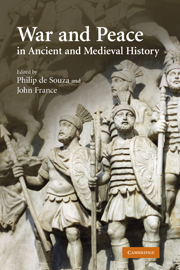Book contents
- Frontmatter
- Contents
- List of contributors
- Acknowledgements
- Note on abbreviations
- 1 Introduction
- 2 Making and breaking treaties in the Greek world
- 3 War, peace and diplomacy in Graeco-Persian relations from the sixth to the fourth century bc
- 4 Treaties, allies and the Roman conquest of Italy
- 5 Parta victoriis pax: Roman emperors as peacemakers
- 6 Treaty-making in Late Antiquity
- 7 Byzantine diplomacy: good faith, trust and co-operation in international relations in Late Antiquity
- 8 Treaties between Byzantium and the Islamic world
- 9 Siege conventions in Western Europe and the Latin East
- 10 Paying the Danegeld: Anglo-Saxon peacemaking with vikings
- 11 Peace among equals: war and treaties in twelfth-century Europe
- Bibliography
- Index
3 - War, peace and diplomacy in Graeco-Persian relations from the sixth to the fourth century bc
Published online by Cambridge University Press: 09 August 2009
- Frontmatter
- Contents
- List of contributors
- Acknowledgements
- Note on abbreviations
- 1 Introduction
- 2 Making and breaking treaties in the Greek world
- 3 War, peace and diplomacy in Graeco-Persian relations from the sixth to the fourth century bc
- 4 Treaties, allies and the Roman conquest of Italy
- 5 Parta victoriis pax: Roman emperors as peacemakers
- 6 Treaty-making in Late Antiquity
- 7 Byzantine diplomacy: good faith, trust and co-operation in international relations in Late Antiquity
- 8 Treaties between Byzantium and the Islamic world
- 9 Siege conventions in Western Europe and the Latin East
- 10 Paying the Danegeld: Anglo-Saxon peacemaking with vikings
- 11 Peace among equals: war and treaties in twelfth-century Europe
- Bibliography
- Index
Summary
This chapter considers the evolution of Graeco-Persian diplomatic relations in the wider context of political relations between the Greek states and Achaemenid Persia. At first glance the history of Graeco-Persian relations looks like a clash between the free Greek city-states and the Achaemenid Empire, which ought to have resulted in the subjugation of the Greeks to a despotic Persian monarch. However, the unification of the Greeks in the Hellenic League in order to defend themselves prevented Persian expansion to the west, and after the initial period of the Persian Wars (499–479 bc) an uneasy peace developed, which was based on a balance of power in the Eastern Mediterranean. It quickly became clear that the most effective way to maintain that balance of power after the failed Persian attempt to conquer the Greeks in the early fifth century bc was by diplomacy. Persian power was balanced by the rise of the hegemonial states of Greece (Athens, Sparta, Thebes and Macedon), which were continually involved in diplomatic relations with Persia during the fifth and fourth centuries bc. Although a long-standing enmity had been created, which the Greeks characterised as a clash between Hellenes of Europe and the ‘barbarians’ of Asia, and there were periods of open warfare between some of the Greek states and Persia, peaceful relations seem to have been preferable to both sides and numerous peace treaties were negotiated by the representatives of Greek states and the Persian king.
- Type
- Chapter
- Information
- War and Peace in Ancient and Medieval History , pp. 28 - 50Publisher: Cambridge University PressPrint publication year: 2008
- 5
- Cited by



